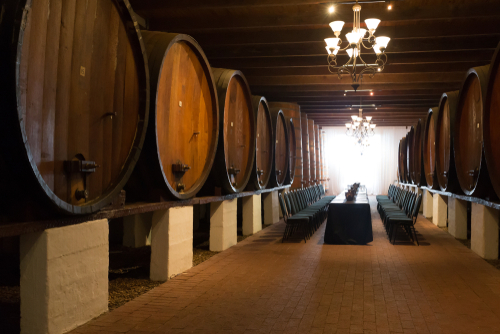 Are you currently booking group or private events? If so, does anyone know about it? A local search on “private event space Denver” yields hundreds of results, however only two were craft breweries, wineries or distilleries (Great Divide Brewery and Archetype Distillery). Is that because other venues and businesses are spending more on Google AdWords to raise visibility of their offerings? Perhaps in metro areas where halls and event spaces are advertising aggressively to stay open during COVID times. But 9 times out of 10 the tasting room simply doesn’t have a web page promoting their event space.
Are you currently booking group or private events? If so, does anyone know about it? A local search on “private event space Denver” yields hundreds of results, however only two were craft breweries, wineries or distilleries (Great Divide Brewery and Archetype Distillery). Is that because other venues and businesses are spending more on Google AdWords to raise visibility of their offerings? Perhaps in metro areas where halls and event spaces are advertising aggressively to stay open during COVID times. But 9 times out of 10 the tasting room simply doesn’t have a web page promoting their event space.
Craft producers ask, “Wait, I don’t have a dedicated space. Can I still promote functions or private events?” The answer is absolutely! If you have a licensed tasting room with the ability to sell beverages to visitors for consumption on-site, you’ve got an event space that can be “reserved” for groups and private parties. As owners and managers you want to maximize every minute your tasting room is open. Events provide another sales source that is generally very profitable:
- Parties typically produce more predictable income
- Knowing the guest count makes staffing easier
- Team members have more control over variables like drink and food menus, service, etc.
- Prepayments could include deposits to reserve the space/time, with the option to collect balance due prior to the event
- If space/capacity allows, parties can run concurrently with normal/public tasting room operations
There’s a great article from SuccessfulBarSecrets.com with tips on successfully executing a function for your business. In it they recommend:
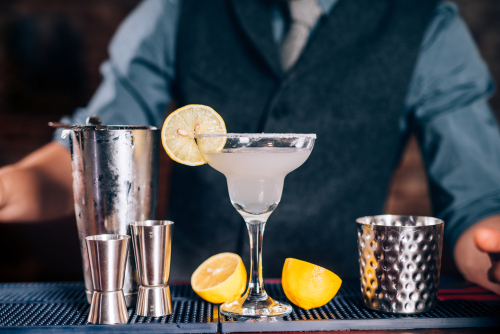 Pre-make cocktail mixes or additions before the function begins
Pre-make cocktail mixes or additions before the function begins- Prep any garnishes
- Offer a watering station where guests can pour their own water (in compliance with COVID-19 guidelines for your state)
- Always have backup glassware
- Provide business cards or promotional materials for guests inquiring about another function
- Create a form (paper or electronic) for prospects to complete, capturing the necessary details for follow-up
- When possible, designate a single point of contact for inquiries and bookings
- Promote your event space online, describing the packages and services offered while allowing guests to request more info
If you’re not already, start thinking about your facility like you would a conference room, a private dining space, a theatre or even a banquet hall. Imagine your guests conducting a business meeting, entertaining a community group or even celebrating a wedding or other special occasion – your space could be perfect for it! And if you’re actively hosting events, but wish you had more interest, read on for ways to promote your craft beverage business.
design your webpage
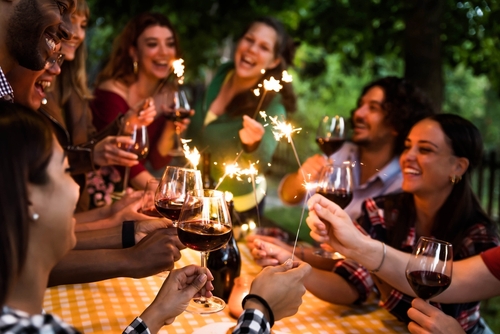 We often talk about helping new customers see themselves enjoying a drink at your tasting room. It’s even MORE critical when they’re evaluating your space for a future special event. However large the group, invitees are all relying on the organizer to get everything right. And there are [usually] no second chances. Putting together a descriptive webpage is the first step towards being discovered as an event venue in a Google search. And filling that page with engaging content is a faster path to “Yes!” from a sales perspective. Consider the following elements of a successful private events page for your business:
We often talk about helping new customers see themselves enjoying a drink at your tasting room. It’s even MORE critical when they’re evaluating your space for a future special event. However large the group, invitees are all relying on the organizer to get everything right. And there are [usually] no second chances. Putting together a descriptive webpage is the first step towards being discovered as an event venue in a Google search. And filling that page with engaging content is a faster path to “Yes!” from a sales perspective. Consider the following elements of a successful private events page for your business:
- Tell your story: within one scroll of the top of the page, give visitors an idea of why they should choose you for their special event. This can be a version of the brand story specific to your event space, for example: “Share your special moments with a housemade beverage in-hand, surrounded by the warmth and personality of our barrel room.”
- Spaces: sometimes we forget just how spectacular production facilities appear to those outside the industry. Polished equipment, towering fermenters, barrels, packaging lines…these are all backdrops for an epic event! “Define” the areas available for reservation, from the production floor and the tasting room to outdoor patios and adjacent spaces. Be sure to include stats on comfortable seating and total capacity.
- Photos: give organizers a sense of space with photos of other parties held in those areas (with permission). Better yet, include a video walkthrough or a first-person perspective of the crowded dance floor 😉
- Menus: you’ll of course want to serve your own craft beverage, but be specific on outside beverage allowances, on-site food options or catering/food truck services.
- General pricing/packages: best to be transparent here. Set your minimum pricing for spaces and provide details on any food, drink or service packages. If you don’t have set packages, consider sharing three different scenarios to help an organizer self-select whether you are even in the ballpark.
- Services and extras: in addition to packages outlined above, list and price any ala carte items that can be added, like stages, audio/visual equipment, curtains, decorations, tables and other furniture.
- Staffing: what role(s) will your team play in the successful execution of the event? From bartending to serving to emceeing, the personality of your brand comes through in your people and that’s what separates your tasting room from other venues.
- Policies: often bullet-pointed at the end, but equally important are the details around payments, changes, cancellations, waivers and alcohol consumption. Best to talk with your legal counsel about this one.
- Inquiry form: collect contact information and event details including dates, times, number of people and any special requests.
If you’ve followed the steps above and designed a webpage promoting your private event space, Congratulations! You’re one step closer to appearing in Google results for searches on “event spaces near me.” And over time your page will organically rise in the rankings to where a searcher doesn’t have to scroll through pages of listings before seeing yours. But what if you’ve got plenty of capacity to host a private event in the next two weeks and want to get the word out? Time to promote your offering a little more aggressively.
promoting your event space
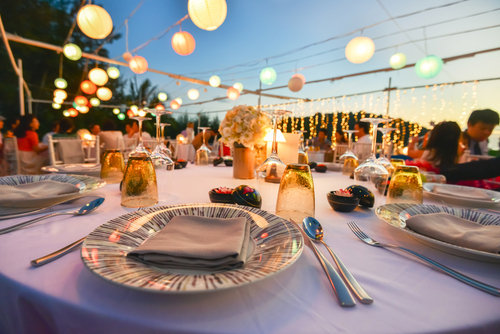 No one will host a function at your tasting room if they don’t know about it. Whether you’re sitting on excess inventory of beverages or have capacity to schedule a couple private events on slow days, the basic premise is the same: advertising creates awareness of your product or service. It starts with free promotion in your tasting room, with signage or pamphlets or check messaging. Where you go from there is a function of time and budget. Consider the following for building awareness of your new or existing private event services:
No one will host a function at your tasting room if they don’t know about it. Whether you’re sitting on excess inventory of beverages or have capacity to schedule a couple private events on slow days, the basic premise is the same: advertising creates awareness of your product or service. It starts with free promotion in your tasting room, with signage or pamphlets or check messaging. Where you go from there is a function of time and budget. Consider the following for building awareness of your new or existing private event services:
- Email: for those customers who have opted in to your newsletter or other email updates, let them know you have the perfect space for their next meeting or party. Provide direct contact information to the General Manager or person in charge of special event scheduling, or link to the webpage and inquiry form.
- Think local: reach out to nearby businesses, community groups, teachers and others who are looking to celebrate the end of 2021 in a space like yours.
- Existing [commercial] customers: your existing network of on- and off-premise retailers may be interested in hosting their holiday parties in your tasting room. If you self-distribute, you already have their contact info and it doesn’t hurt to ask. Same is true for other craft producers in the area.
- Social: design a series of posts across all the major channels (Facebook, Instagram, Twitter and LinkedIn) with messaging and engaging visuals around planning special events with your tasting room in mind. Put a little money around boosting or promoting those posts to target geographies and audiences.
- Google AdWords: phrases like, “private event space,” have higher CPC (cost per click) because you’re competing with every business with an event venue. Consider bidding on phrases like, “wedding at a tasting room” or something more specific for a greater chance of higher search results.
- YouTube: if you already have a YouTube channel for your business, consider posting video content of prior events (with permission). Think video montages of weddings, receptions, meetings and other events that show the breadth and depth of services your space accommodates.
Now that you’ve built some awareness around your private event space and the services you offer, it’s time for some next-level organization to make managing inquiries and bookings easier for your team.
event management software
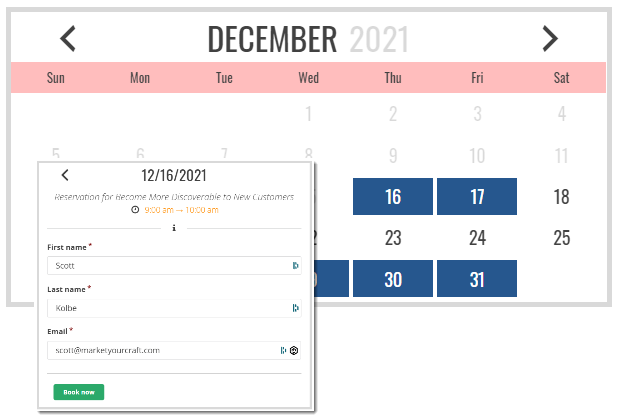 Eliminate unnecessary back-and-forth between your team members and event organizers by adding a calendar tool to your website! If you have specific date and time windows that are open for private event booking, you can make that availability known at the time of inquiry. The same general event details can be collected during the calendar request, eliminating the need for the general inquiry form. Best of all, calendars can be synced with your Google, Outlook or other back-office calendar system so it’s always up-to-date. Two popular services include:
Eliminate unnecessary back-and-forth between your team members and event organizers by adding a calendar tool to your website! If you have specific date and time windows that are open for private event booking, you can make that availability known at the time of inquiry. The same general event details can be collected during the calendar request, eliminating the need for the general inquiry form. Best of all, calendars can be synced with your Google, Outlook or other back-office calendar system so it’s always up-to-date. Two popular services include:
- Team Booking: used on the marketyourcraft.com website, this appointment scheduling tool can easily be used for managing special event bookings and other functions. Includes confirmation email, calendar download and WordPress management tools.
- BookThatApp: a highly-rated app designed for Shopify stores, offering flexible booking forms, custom reminders, room and space registration and back-end appointment management. Integrates easily with Google Calendar, iCal, Outlook and others.
Remember: once you add a calendar tool, it’s important to keep it up-to-date. Settings within the apps allow control over which details are displayed to organizers (who really only need to see availability). Setting up email or other push notifications will ensure that your team is actively checking for and responding to inquiries so you don’t miss a potential sale.
MailChimp archive:
https://mailchi.mp/00ec22336200/211216_privateeventspace?e=bd76eedb35
Download:
https://app.box.com/s/z6ylr9c9691uxyxtbq19atlsdpmv7tj3



